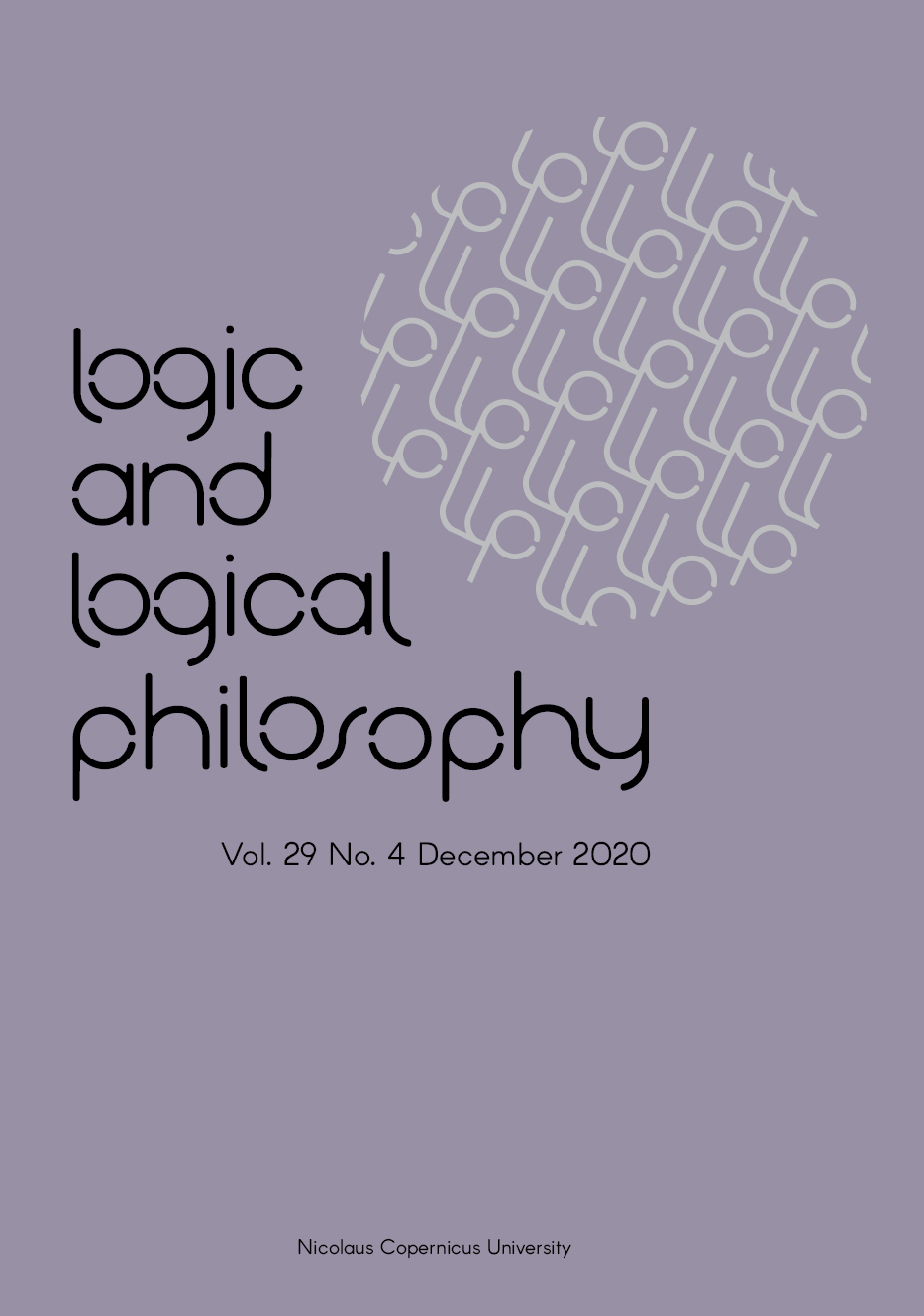Chisholm's Modal Paradox(es) and Counterpart Theory 50 Years On
DOI:
https://doi.org/10.12775/LLP.2020.008Keywords
Chisholm’s paradox, counterpart theory, Lewis, Salmon, Forbes, WilliamsonAbstract
Lewis’s [1968] counterpart theory (LCT for short), motivated by his modal realism, made its appearance within a year of Chisholm’s modal paradox [1967]. We are not modal realists, but we argue that a satisfactory resolution to the paradox calls for a counterpart-theoretic (CT-)semantics. We make our case by showing that the Chandler–Salmon strategy of denying the S4 axiom [◊◊ψ →◊ψ] is inadequate to resolve the paradox – we take on Salmon’s attempts to defend that strategy against objects from Lewis and Williamson. We then consider three substantially different CT-approaches: Lewis’s LCT, Forbes’s (FCT), including his fuzzy version, and Ramachandran’s (RCT). We argue that the best approach is a mish-mash of FCT and RCT.References
Chandler, H.S., 1976, “Plantinga and the contingently possible”, Analysis 36 (2): 106–109. DOI: http://dx.doi.org/10.1093/analys/36.2.106
Chisholm, R.M., 1967, “Identity through possible worlds: Some questions”, Noûs 1 (1): 1–8. DOI: http://dx.doi.org/10.2307/2214708
Chisholm, R.M., 1973, “Parts as essential to their wholes”, Review of Metaphysics 26 (4): 581–603. DOI: http://dx.doi.org/revmetaph197326466
Forbes, G., 1982, “Canonical counterpart theory”, Analysis 42 (1): 33–37. DOI: http://dx.doi.org/10.1093/analys/42.1.33
Forbes, G., 1983, “Thisness and vagueness”, Synthese 54 (2): 235–259. DOI: http://dx.doi.org/10.1007/BF00869393
Forbes, G., 1984, “Two solutions to chisholm’s paradox”, Philosophical Studies 46 (2): 171–187. DOI: http://dx.doi.org/10.1007/BF00373102
Forbes, G., 1990, “Counterparts, logic and metaphysics: Reply to Ramachandran”, Analysis 50 (3): 167–173. DOI: http://dx.doi.org/10.1093/analys/50.3.167
Kripke, S.A., 1980, Naming and Necessity, Harvard University Press.
Lewis, D.K., 1968, “Counterpart theory and quantified modal logic”, Journal of Philosophy 65 (5): 113–126. DOI: http://dx.doi.org/10.2307/2024555
Lewis, D.K., 1986, On the Plurality of Worlds, Wiley-Blackwell.
Ramachandran, M., 1989, “An alternative translation scheme for counterpart theory”, Analysis 49 (3): 131–141. DOI: http://dx.doi.org/10.1093/analys/49.3.131
Ramachandran, M., 2008, “Kripkean counterpart theory”, Polish Journal of Philosophy 2 (2): 89–106. DOI: http://dx.doi.org/10.5840/pjphil20082221
Salmon, N., 1981, Reference and Essence, Princeton, New Jersey: Princeton University Press.
Salmon, N., 1986, “Modal paradox: Parts and counterparts, points and counterpoints”, Midwest Studies in Philosophy 11 (1): 75–120. DOI: http://dx.doi.org/10.1111/j.1475-4975.1986.tb00489.x
Salmon, N., 1989, “The logic of what might have been”, Philosophical Review 98 (1): 3–34 [reprinted in Salmon, 2005, pp. 129–149]. DOI: http://dx.doi.org/10.2307/2185369
Salmon, N., 1993, “This side of paradox”, Philosophical Topics 21 (2): 187–197 [reprinted in Salmon, 2005, pp. 155–164]. DOI: http://dx.doi.org/10.5840/philtopics199321219
Salmon, N., 2005, Metaphysics, Mathematics, and Meaning: Philosophical Papers, Volume I, Oxford: Clarendon Press.
Schwarz, W., 2012, “How things are elsewhere: Adventures in counterpart semantics”, chapter 1, pages 8–29, in G. Restall and G. Russell (eds.), New Waves in Philosophical Logic, Palgrave MacMillan UK, Basingstoke.
Sider, T., 2001, Four-Dimensionalism: An Ontology of Persistence and Time, Oxford: Clarendon Press.
Stalnaker, R., 1986, “Counterparts and identity”, Midwest Studies in Philosophy 11 (1): 121–40. DOI: http://dx.doi.org/10.1111/j.1475-4975.1986.tb00490.x
Williamson, T., 1990, Identity and Discrimination, Wiley-Blackwell.
Woollaston, L., 1994, “Counterpart theory as a semantics for modal logic”, Logique et Analyse 37 (147–148): 255–263.
Downloads
Published
How to Cite
Issue
Section
Stats
Number of views and downloads: 854
Number of citations: 0







